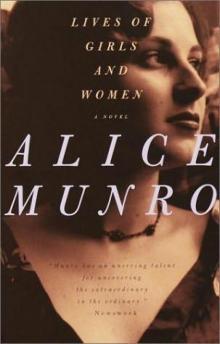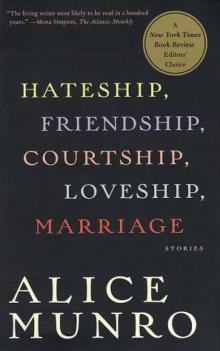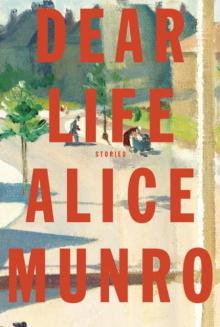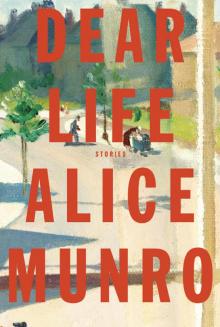- Home
- Alice Munro
Dear Life Page 2
Dear Life Read online
Page 2
“Well that’s very nice,” he said, and started to back out.
On Lions Gate Bridge he said, “Excuse me for sounding how I did. I was thinking whether I would or wouldn’t kiss you and I decided I wouldn’t.”
She thought he was saying that there was something about her that didn’t quite measure up to being kissed. The mortification was like being slapped clean back into sobriety.
“Now when we get over the bridge do we go right on Marine Drive?” he continued. “I’ll rely on you to tell me.”
During the coming fall and winter and spring there was hardly a day when she didn’t think of him. It was like having the very same dream the minute you fell asleep. She would lean her head against the back pillow of the sofa, thinking that she lay in his arms. You would not think that she’d remember his face but it would spring up in detail, the face of a creased and rather tired-looking, satirical, indoor sort of man. Nor was his body lacking, it was presented as reasonably worn but competent, and uniquely desirable.
She nearly wept with longing. Yet all this fantasy disappeared, went into hibernation when Peter came home. Daily affections sprang to the fore then, reliable as ever.
The dream was in fact a lot like the Vancouver weather—a dismal sort of longing, a rainy dreamy sadness, a weight that shifted round the heart.
So what about the rejection of kissing, that might seem an ungallant blow?
She simply cancelled it out. Forgot about it entirely.
And what about her poetry? Not a line, not a word. Not a hint that she had ever cared for it.
Of course she gave these fits houseroom mostly when Katy was napping. Sometimes she spoke his name out loud, she embraced idiocy. This followed by a scorching shame in which she despised herself. Idiocy indeed. Idiot.
Then a jolt came, the prospect then certainty of the job at Lund, the offer of the house in Toronto. A clear break in the weather, an access of boldness.
She found herself writing a letter. It didn’t begin in any conventional way. No Dear Harris. No Remember me.
Writing this letter is like putting a note in a bottle—
And hoping
It will reach Japan.
Nearest thing to a poem in some time.
She had no idea of an address. She was bold and foolish enough to phone the people who had given the party. But when the woman answered her mouth went dry and felt as big as a tundra and she had to hang up. Then she carted Katy over to the public library and found a Toronto phone book. There were lots of Bennetts but not a single Harris or H. Bennett.
She had a shocking idea then, to look in the obituaries. She couldn’t stop herself. She waited till the man reading the library copy was finished. She did not see the Toronto paper usually because you had to go over the bridge to get it, and Peter always brought home the Vancouver Sun. Rustling through its pages finally she found his name at the top of a column. So he was not dead. A newspaper columnist. Naturally he would not want to be bothered with people calling him by name, at home.
He wrote about politics. His writing seemed intelligent but she did not care anything about it.
She sent her letter to him there, at the newspaper. She could not be sure that he opened his own mail and she thought that putting Private on the envelope was asking for trouble, so she wrote only the day of her arrival and the time of the train, after the bit about the bottle. No name. She thought that whoever opened the envelope might think of an elderly relative given to whimsical turns of phrase. Nothing to implicate him, even supposing such peculiar mail did get sent home and his wife opened it, being now out of the hospital.
Katy had evidently not understood that Peter’s being outside on the platform meant that he would not be travelling with them. When they began to move and he didn’t, and when with gathering speed they left him altogether behind, she took the desertion hard. But she settled down in a while, telling Greta that he would be there in the morning.
When that time came Greta was apprehensive, but Katy made no mention at all of the absence. Greta asked her if she was hungry and she said yes, then explained to her mother—as Greta had explained to her before they ever got on the train—that they now had to take off their pajamas and look for their breakfast in another room.
“What do you want for breakfast?”
“Crisp peas.” That meant Rice Krispies.
“We’ll see if they have them.”
They did.
“Now will we go and find Daddy?”
There was a play area for children but it was quite small. A boy and a girl—a brother and sister, by the looks of their matching bunny-rabbit outfits—had taken it over. Their game consisted of running small vehicles at each other then deflecting them at the last moment. CRASH BANG CRASH.
“This is Katy,” Greta said. “I’m her mom. What are your names?”
The crashing took on more vehemence but they didn’t look up.
“Daddy isn’t here,” said Katy.
Greta decided that they had better go back and get Katy’s Christopher Robin book and take it up to the dome car and read it. They wouldn’t be likely to bother anybody because breakfast wasn’t over and the important mountain scenery hadn’t started.
The problem was that once she finished Christopher Robin, Katy wanted it started again, immediately. During the first reading she had been quiet, but now she began chiming in with ends of lines. Next time she chanted word for word though still not ready to try it by herself. Greta could imagine this being an annoyance to people once the dome car filled up. Children Katy’s age had no problem with monotony. In fact they embraced it, diving into it and wrapping the familiar words round their tongues as if they were a candy that could last forever.
A boy and a girl came up the stairs and sat down across from Greta and Katy. They said good morning with considerable cheer and Greta responded. Katy rather disapproved of her acknowledging them and continued to recite softly with her eyes on the book.
From across the aisle came the boy’s voice, almost as quiet as hers:
They’re changing guard at Buckingham Palace—
Christopher Robin went down with Alice.
After he finished that one he started another. “‘I do not like them, Sam-I-am.’”
Greta laughed but Katy didn’t. Greta could see that she was a bit scandalized. She understood silly words coming out of a book but not coming out of somebody’s mouth without a book.
“Sorry,” said the boy to Greta. “We’re preschoolers. That’s our literature.” He leaned across and spoke seriously and softly to Katy.
“That’s a nice book, isn’t it?”
“He means we work with preschoolers,” the girl said to Greta. “Sometimes we do get confused though.”
The boy went on talking to Katy.
“I maybe could guess your name now. What is it? Is it Rufus? Is it Rover?”
Katy bit her lips but then could not resist a severe reply.
“I’m not a dog,” she said.
“No. I shouldn’t have been so stupid. I’m a boy and my name’s Greg. This girl’s name is Laurie.”
“He was teasing you,” said Laurie. “Should I give him a swat?”
Katy considered this, then said, “No.”
“‘Alice is marrying one of the guard,’” Greg continued, “‘A soldier’s life is terrible hard, says Alice.’”
Katy chimed in softly on the second Alice.
Laurie told Greta that they had been going around to kindergartens, doing skits. This was called reading readiness work. They were actors, really. She was going to get off at Jasper, where she had a summer job waitressing and doing some comic bits. Not reading readiness exactly. Adult entertainment, was what it was called.
“Christ,” she said. She laughed. “Take what you can get.”
Greg was loose, and stopping off in Saskatoon. His family was there.
They were both quite beautiful, Greta thought. Tall, limber, almost unnaturally lean, he with crinkly d
ark hair, she black-haired and sleek as a Madonna. When she mentioned their similarity a bit later on, they said they had sometimes taken advantage of it, when it came to living arrangements. It made things no end easier, but they had to remember to ask for two beds and make sure both got mussed up overnight.
And now, they told her, now they didn’t need to worry. Nothing to be scandalized about. They were breaking up, after three years together. They had been chaste for months, at least with each other.
“Now no more Buckingham Palace,” said Greg to Katy. “I have to do my exercises.”
Greta thought this meant that he had to go downstairs or at least into the aisle for some calisthenics, but instead he and Laurie threw their heads back, stretched their throats, and began to warble and caw and do strange singsongs. Katy was delighted, taking all this as an offering, a show for her benefit. She behaved as a proper audience, too—quite still until it ended, then breaking out in laughter.
Some people who had meant to come up the stairs had stopped at the bottom, less charmed than Katy and not knowing what to make of things.
“Sorry,” said Greg, with no explanation but a note of intimate friendliness. He held out a hand to Katy.
“Let’s see if there’s a playroom.”
Laurie and Greta followed them. Greta was hoping that he wasn’t one of those adults who make friends with children mostly to test their own charms, then grow bored and grumpy when they realize how tireless a child’s affections can be.
By lunchtime or sooner, she knew that she didn’t need to worry. What had happened wasn’t that Katy’s attentions were wearing Greg out, but that various other children had joined the competition and he was giving no sign of being worn out at all.
He didn’t set up a competition. He managed things so that he turned the attention first drawn to himself into the children’s awareness of each other, and then into games that were lively or even wild, but not bad-tempered. Tantrums didn’t occur. Spoils vanished. There simply was not time—so much more interesting stuff was going on. It was a miracle, how much ease with wildness was managed in such a small space. And the energy expended promised naps in the afternoon.
“He’s remarkable,” Greta said to Laurie.
“He’s mostly just there,” Laurie said. “He doesn’t save himself up. You know? A lot of actors do. Actors in particular. Dead offstage.”
Greta thought, That’s what I do. I save myself up, most of the time. Careful with Katy, careful with Peter.
In the decade that they had already entered but that she at least had not taken much notice of, there was going to be a lot of attention paid to this sort of thing. Being there was to mean something it didn’t use to mean. Going with the flow. Giving. Some people were giving, other people were not very giving. Barriers between the inside and outside of your head were to be trampled down. Authenticity required it. Things like Greta’s poems, things that did not flow right out, were suspect, even scorned. Of course she went right on doing as she did, fussing and probing, secretly tough as nails on the counterculture. But at the moment, her child surrendered to Greg, and to whatever he did; she was entirely grateful.
In the afternoon, as Greta had predicted, the children went to sleep. Their mothers too in some cases. Others played cards. Greg and Greta waved to Laurie when she got off at Jasper. She blew kisses from the platform. An older man appeared, took her suitcase, kissed her fondly, looked towards the train and waved to Greg. Greg waved to him.
“Her present squeeze,” he said.
More waves as the train got going, then he and Greta took Katy back to the compartment, where she fell asleep between them, asleep in the very middle of a jump. They opened the compartment curtain to get more air, now that there was no danger of the child’s falling out.
“Awesome to have a child,” Greg said. That was another word new at the time, or at least new to Greta.
“It happens,” she said.
“You’re so calm. Next you’ll say, ‘That’s life.’”
“I will not,” Greta said, and outstared him till he shook his head and laughed.
He told her that he had got into acting by way of his religion. His family belonged to some Christian sect Greta had never heard of. This sect was not numerous but very rich, or at least some of them were. They had built a church with a theater in it in a town on the prairie. That was where he started to act before he was ten years old. They did parables from the Bible but also present day, about the awful things that happened to people who didn’t believe what they did. His family was very proud of him and of course so he was of himself. He wouldn’t dream of telling them all that went on when the rich converts came to renew their vows and get revitalized in their holiness. Anyway he really liked getting all the approval and he liked the acting.
Till one day he just got the idea that he could do the acting and not go through all that church stuff. He tried to be polite about it, but they said it was the Devil getting hold. He said ha-ha I know who it was getting hold.
Bye-bye.
“I don’t want you to think it was all bad. I still believe in praying and everything. But I never could tell my family what went on. Anything halfway true would just kill them. Don’t you know people like that?”
She told him that when she and Peter first moved to Vancouver her grandmother, who lived in Ontario, had got in touch with a minister of a church there. He came to call and she, Greta, was very snooty to him. He said he would pray for her, and she as good as said, don’t bother. Her grandmother was dying at the time. Greta felt ashamed and mad about being ashamed whenever she thought about it.
Peter didn’t understand all that. His mother never went to church though one reason she had carried him through the mountains was presumably so they could be Catholics. He said Catholics probably had an advantage, you could hedge your bets right until you were dying.
This was the first time she had thought of Peter in a while.
The fact was that she and Greg were drinking while all this anguished but also somewhat comforting talk went on. He had produced a bottle of ouzo. She was fairly cautious with it, as she had been with any alcohol she’d had since the writers’ party, but some effect was there. Enough that they began to stroke each other’s hands and then to engage in some kissing and fondling. All of which had to go on beside the body of the sleeping child.
“We better stop this,” Greta said. “Otherwise it will become deplorable.”
“It isn’t us,” said Greg. “It’s some other people.”
“Tell them to stop, then. Do you know their names?”
“Wait a minute. Reg. Reg and Dorothy.”
Greta said, “Cut that out, Reg. What about my innocent child?”
“We could go to my berth. It’s not far along.”
“I haven’t got any—”
“I have.”
“Not on you?”
“Certainly not. What kind of a beast do you think I am?”
So they arranged whatever clothing had been disarranged, slipped out of the compartment, carefully fastened every button of the berth where Katy was sleeping, and with a certain fancy nonchalance made their way from Greta’s car to his. This was hardly necessary—they met no one. The people who were not in the dome car taking pictures of the everlasting mountains were in the bar car, or dozing.
In Greg’s untidy quarters they took up where they had left off. There was no room for two people to lie down properly but they managed to roll over each other. At first no end of stifled laughter, then the great shocks of pleasure, with no place to look but into each other’s wide eyes. Biting each other to hold in some ferocious noise.
“Nice,” said Greg. “All right.”
“I’ve got to get back.”
“So soon?”
“Katy might wake up and I’m not there.”
“Okay. Okay. I should get ready for Saskatoon anyway. What if we’d got there just in the middle of it? Hello Mom. Hello Daddy. Excuse me just a minute here w
hile I—Wa—hoo!”
She got herself decent and left him. Actually she didn’t much care who met her. She was weak, shocked, but buoyant, like some gladiator—she actually thought this out and smiled at it—after a session in the arena.
Anyway, she didn’t meet a soul.
The bottom fastener of the curtain was undone. She was sure she remembered fastening it. Though even with it open Katy could hardly get out and surely wouldn’t try. One time when Greta had left for a minute to go to the toilet, she had explained thoroughly that Katy must never try to follow, and Katy had said, “I wouldn’t,” as if even to suggest that was treating her like a baby.
Greta took hold of the curtains to open them all the way, and when she had done so she saw that Katy was not there.
She went crazy. She yanked up the pillow, as if a child of Katy’s size could have managed to cover herself with it. She pounded her hands on the blanket as if Katy could have been hiding underneath it. She got control of herself and tried to think where the train had stopped, or whether it had been stopped, during the time she had been with Greg. While it was stopped, if it had been stopped, could a kidnapper have got on the train and somehow made off with Katy?
She stood in the aisle, trying to think what she had to do to stop the train.
Then she thought, she made herself think, that nothing like that could have happened. Don’t be ridiculous. Katy must have wakened and found her not there and gone looking for her. All by herself, she had gone looking.
Right around here, she must be right around here. The doors at either end of the coach were far too heavy for her to open.
Greta could barely move. Her whole body, her mind, emptied. This could not have happened. Go back, go back, to before she went with Greg. Stop there. Stop.
Across the aisle was a seat unoccupied for the time being. A woman’s sweater and some magazine left to claim it. Farther along, a seat with the fasteners all done up, as hers—theirs—had been. She pulled them apart with one grab. The old man who was sleeping there turned over on his back but never woke up. There was no way he could be hiding anybody.

 Runaway
Runaway Lives of Girls and Women
Lives of Girls and Women Dance of the Happy Shades
Dance of the Happy Shades Open Secrets
Open Secrets Julieta (Movie Tie-in Edition)
Julieta (Movie Tie-in Edition) Hateship, Friendship, Courtship, Loveship, Marriage: Stories
Hateship, Friendship, Courtship, Loveship, Marriage: Stories Alice Munro's Best
Alice Munro's Best The Progress of Love
The Progress of Love Selected Stories
Selected Stories Away from Her
Away from Her Family Furnishings
Family Furnishings Moons of Jupiter
Moons of Jupiter Who Do You Think You Are?
Who Do You Think You Are? Hateship, Friendship, Courtship, Loveship, Marriage
Hateship, Friendship, Courtship, Loveship, Marriage The Moons of Jupiter
The Moons of Jupiter Vintage Munro
Vintage Munro The Love of a Good Woman
The Love of a Good Woman Too Much Happiness
Too Much Happiness Lying Under the Apple Tree
Lying Under the Apple Tree Dear Life
Dear Life Dear Life: Stories
Dear Life: Stories Friend of My Youth
Friend of My Youth Dance of the Happy Shades: And Other Stories
Dance of the Happy Shades: And Other Stories The Beggar Maid
The Beggar Maid